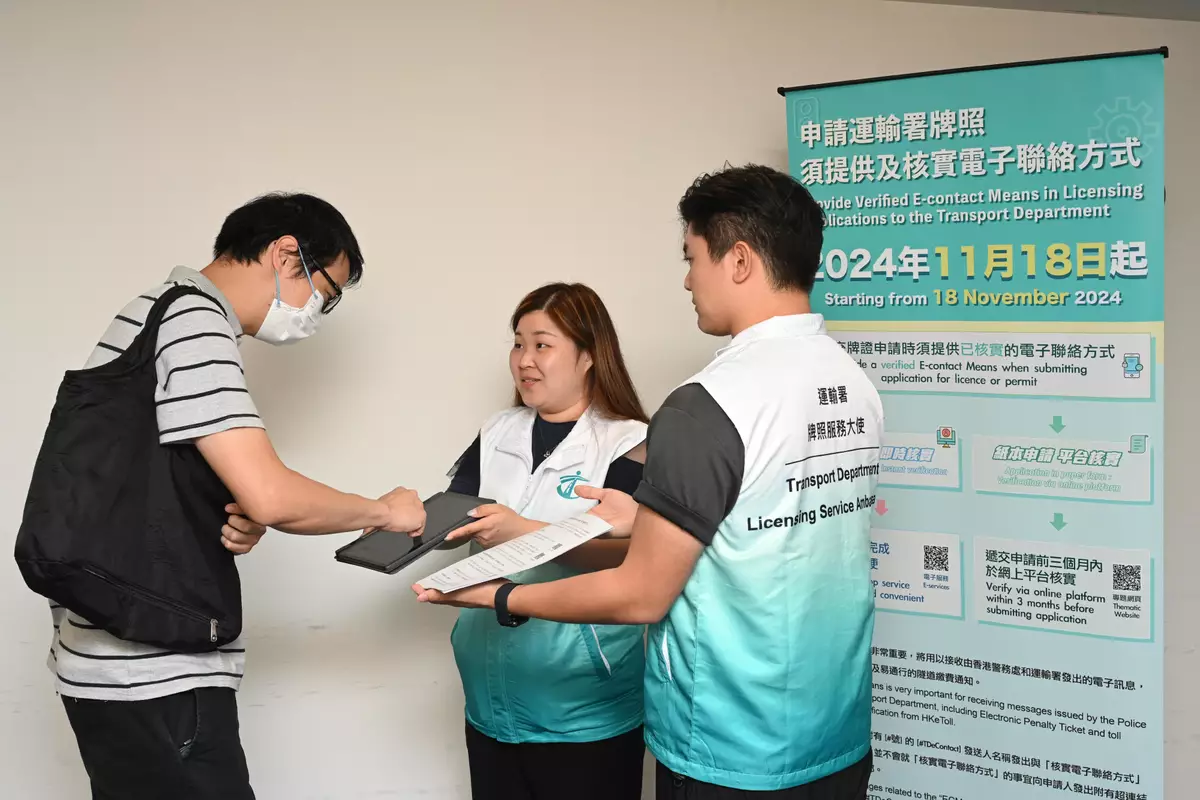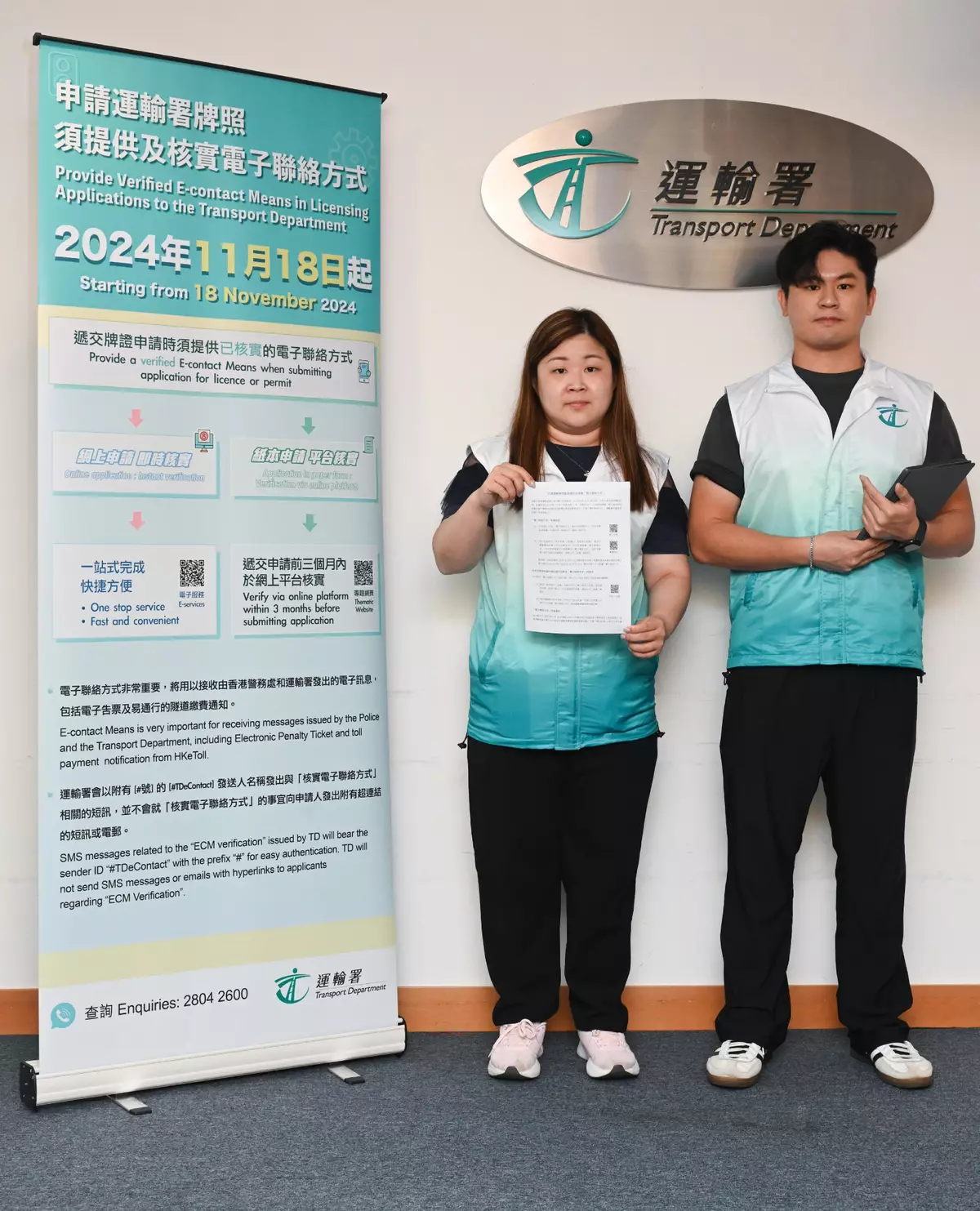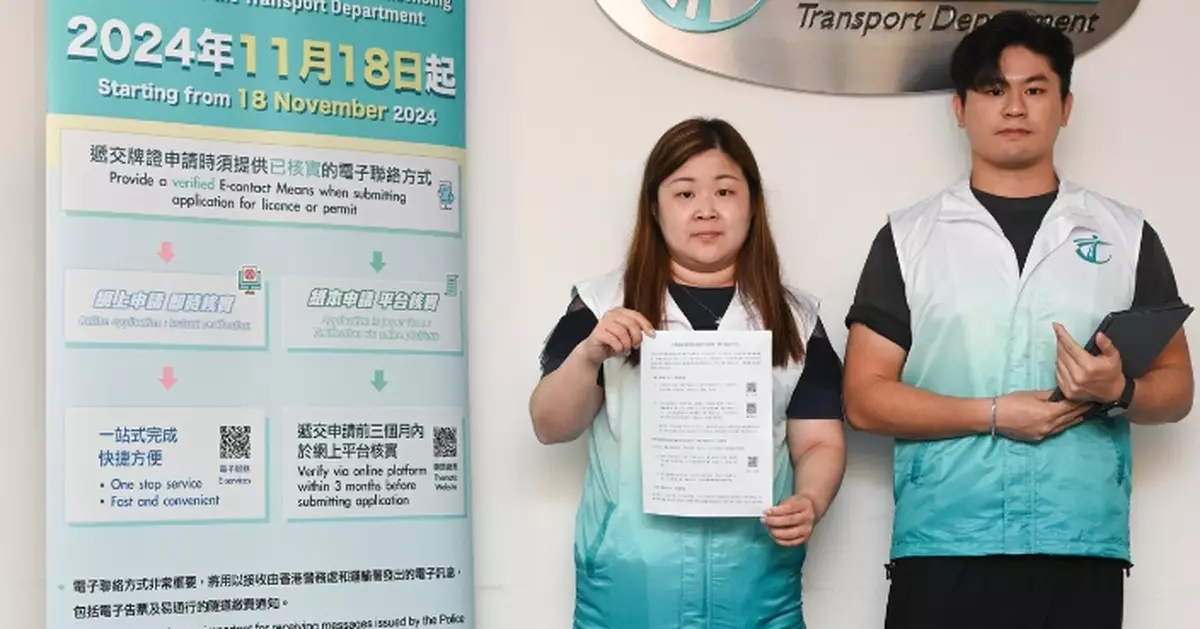Provision of verified e-contact means by TD licence applicants mostly smooth so far
The Transport Department (TD) said that, starting from today (November 18), applicants for the new issue or renewal of 21 driving and vehicle licences must provide a verified Hong Kong mobile phone number or email address as the e-contact means (ECM) before the TD processes the relevant licence/permit applications.
The TD encourages the public to submit applications online, so that they can provide and instantly verify their ECM during the application process, thereby saving time and enjoying convenience. If a paper application is necessary, members of the public must provide a verified ECM via a one-time password on the TD's designated online platform within three months before submission, and provide the same verified ECM in the application form before submitting the application.
A spokesman for the TD said that those planning to submit licence/permit applications are having their ECM verified, and such arrangements have been proceeding smoothly so far. The spokesman reminded the public that the record of verified ECM is valid for three months and it can be used for more than one licensing application within the validity period. Moreover, a correct, frequently-used and verified Hong Kong mobile phone number or email address should be provided to ensure timely receipt of notifications of the Police and the TD in future. The public should also note that the verified ECM will only be automatically updated in the applicant's records of driving licence and/or all vehicle(s) registered under his/her name after the application concerned has been approved.
A total of 30 Licensing Service Ambassadors have been deployed at the four Licensing Offices at United Centre in Admiralty, Cheung Sha Wan Government Offices, Sha Tin Government Offices and Kowloon East Government Offices in Kwun Tong as well as the Cross Boundary Unit at Harbour Building in Central to assist the public in verifying their ECM and submitting applications. The TD will issue letters in batches to about 300000 registered vehicle owners and driving licence holders whose licences will expire in the following four months, drawing their attention to the legal requirements.
For any change of ECM, a licence holder must notify the TD within 72 hours through the online services in "GovHK" or by submitting form TD559. Any person in contravention of such requirement without reasonable excuse commits an offence and is liable to a fine of $2,000 upon conviction.
The public may refer to the TD's thematic webpage, HKeMobility mobile application and Agent T Facebook page (www.facebook.com/AgentT.hk), or call the hotline at 28042600 for details.

Provision of verified e-contact means by TD licence applicants mostly smooth so far Source: HKSAR Government Press Releases

Provision of verified e-contact means by TD licence applicants mostly smooth so far Source: HKSAR Government Press Releases
Public urged to support World Antimicrobial Resistance Awareness Week
The Department of Health (DH) today (November 18) urged members of the public to use antibiotics appropriately in support of World Antimicrobial Resistance (AMR) Awareness Week, running from today to November 24 annually. The theme of the World Health Organization (WHO) this year is "Educate. Advocate. Act now."
AMR remains a top global threat to public health. According to a recent overseas study, it was estimated that about 4.71 million deaths were associated with bacterial AMR globally in 2021, including 1.14 million deaths attributable to bacterial AMR. Forecasts show that an estimated 1.91 million deaths attributable to AMR and 8.22 million deaths associated with AMR could occur globally in 2050. The WHO is urging a concerted global effort through cross-sector collaboration via the One Health approach to tackle this AMR threat.
In 2016 the Government set up a High Level Steering Committee on AMR (HLSC) and formulated the first Hong Kong Strategy and Action Plan on Antimicrobial Resistance (Action Plan) in 2017. Since the launch of the Action Plan, a series of actions against AMR have been implemented in accordance with the strategies laid out in the plan by different action parties, with good progress being made. In 2022, the Government launched the second Action Plan to map out response strategies for the next phase, covering the years from 2023 to 2027.
Educate
The Centre for Health Protection of the DH has long educated healthcare professionals and the public on the proper use of antibiotics, and has regularly monitored the knowledge, attitude and practice of the public on antibiotic resistance. Increasing knowledge of AMR among the general public has been noted according to the latest results of a survey in 2023. For instance, respondents correctly answering that cold and influenza should not be treated by antibiotics increased from 37 per cent in a 2016/17 survey to 84 per cent in the 2023 survey. Moreover, respondents who completed the entire course of antibiotic treatment as instructed by doctors increased from 88 per cent to 92 per cent in the same period. Yet, less than 40 per cent of respondents were aware that bacteria resistant to antibiotics can be spread from person to person.
The Food and Environmental Hygiene Department (FEHD) has long been educating the public to observe good personal and environmental hygiene throughout food preparation and handling to reduce the risk of AMR. In addition to organising talks and producing guidelines and pamphlets, the Centre for Food Safety of the FEHD has also incorporated relevant content into the training courses under the Hygiene Manager and Hygiene Supervisor Scheme.
Advocate
The Government has established a surveillance system to track the trends of antimicrobial use and antimicrobial resistance in the human, animal and food sectors according to the Action Plan. Further research will be conducted to better understand the situation of AMR in the local environment.
Antimicrobial Stewardship Programmes are in place in public and private hospitals to optimise the use of antibiotics by providing evidence-based antibiotic prescription guidelines for common infections as a reference. The guidelines will continue to be updated based on local epidemiology and international best practices.
Furthermore, to address the threat of emerging multidrug resistant organisms (MDROs) in residential care homes for the elderly (RCHEs), the Government has enhanced support to RCHEs to strictly implement infection control measures and reduce the risk of transmission of MDROs in the RCHEs.
Regarding the livestock sector, the Agriculture, Fisheries and Conservation Department (AFCD) has implemented the "veterinary prescription-only medication supply" policy in phases at the local livestock farm level to tighten the regulation on the use of antimicrobials in animal husbandry, in particular those critically important antimicrobials for humans.
Act now
The Government has long attached great importance to tackling the issue of AMR, and has acted promptly according to the latest international and local developments. Relevant bureaux/departments and organisations, including the Health Bureau, the DH, the FEHD, the AFCD and the Hospital Authority will continue to combat the challenge of AMR through cross-sector co-ordination and collaboration with private hospitals, professional bodies, academia and other stakeholders.
In light of the latest findings, a spokesman for the CHP urged members of the public to join the fight against antibiotic resistance by observing the following advice:
Take adequate rest and drink plenty of water when having a cold or flu. If symptoms persist, consult a doctor and do not buy antibiotics without a prescription at community pharmacies;
Do not demand antibioticsfrom doctorswhen not indicated. Only take antibiotics when advised by doctors and complete the whole course of treatment even if symptoms have improved;
Follow precautions stated on the prescription bag and adopt appropriate infection control measures such as practising frequent hand hygiene, wearing a surgical mask when having respiratory symptoms, and disinfecting and covering all wounds properly to prevent person-to-person spread of resistant bacteria when taking antibiotics;
Receive seasonal influenza and COVID-19 vaccines as effective means to prevent secondary bacterial infection, hence reducing the use of antibiotics and occurrence of AMR;
Be aware of the risk of acquiring resistant bacteria from ready-to-eat (RTE) food. People taking antibiotics or antacids, and susceptible populations (such as pregnant women, infants and young children, the elderly and people with weakened immunity) are of higher risk and should therefore avoid eating raw and undercooked RTE foods; and
Observe good hygienic practices in the kitchen when handling food to minimise the risk of cross-contamination by resistant bacteria.
The CHP will continue to work with doctors to enhance education on the appropriate use of antibiotics and to remind patients about risk of antimicrobial resistance. For details of information about antimicrobial resistance, please visit the CHP thematic website and the CHP Facebook Page.








